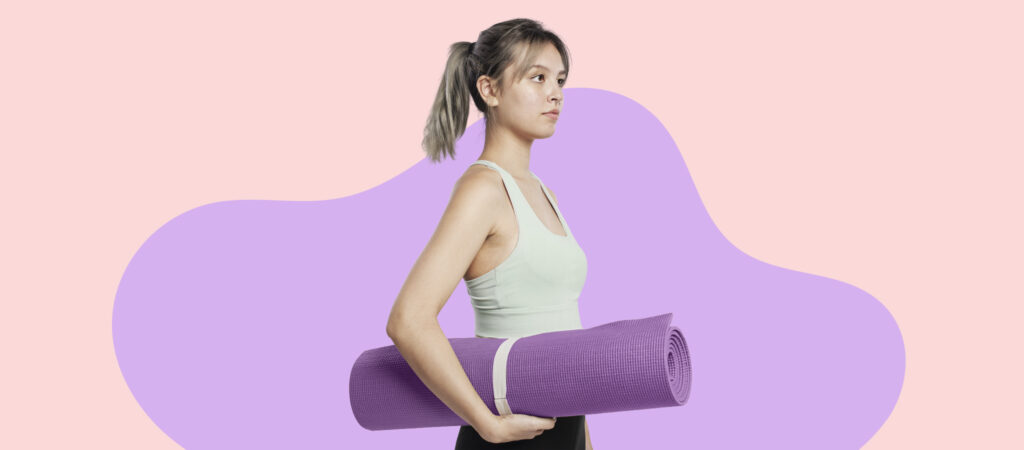5 Ways to Combat Your Anxiety

Medically reviewed by Susan Vachon, PA-C on January 10, 2022
Feeling anxious? We all do from time to time. In fact, anxiety disorders are the most common mental health condition in the United States. Fortunately, there are steps you can take to help combat anxiety.
There are plenty of ways you can focus your mind, help your brain relax, and reduce your anxiety. By practicing some of these methods, you may find yourself calmer than ever.
1. Take Regular Walks
Exercise, in general, is great for anxiety, and as it turns out, walking may have additional benefits. Scientists have noticed that taking a walk in a forest leads to a decrease in two stress hormones: adrenaline and noradrenaline.
Nurx offers prescription treatment for anxiety and depression for as little as $0 in copays or $25 per month without insurance.
Typically, adrenaline levels spike when you’re anticipating problems or facing an unpredictable situation. In other words, typically during stressful moments. Noradrenaline, on the other hand, is a neurotransmitter released by the sympathetic nervous system. This is the part of the brain responsible for your fight-or-flight reaction to stress, so it can cause symptoms like rapid heartbeat, shallow breathing, and tense muscles. Decreasing these two stress hormones can help relieve your symptoms and make you feel calmer.
Not only can walking help with stress hormones, but it can also help with the release of endorphins, which are feel-good chemicals in the brain. You might feel calmer and happier with more of them in your system.
The ideal walking routine would be 30 minutes a day for three to five days a week, but it all depends on your schedule. Don’t feel discouraged if you can’t get all that walking in, as even a quick 10-minute burst can help with your symptoms.
2. Cut Back on Caffeine and Alcohol
You probably already know that caffeine and alcohol aren’t the best for you. But did you know they might be contributing to your anxiety? Research shows that caffeine can actually induce anxiety at high doses. So, if you’re on your fifth cup of coffee for the day, consider starting to cut back as these can contribute to experiencing more stress.
Alcohol works differently. When you’re first drinking, you may find that alcohol actually helps with your anxiety, as it is a depressant that slows down parts of the brain. It will also trigger a release of dopamine and serotonin in your brain, two neurotransmitters responsible for feeling pleasure. When the alcohol wears off (and your feel-good dose of neurotransmitters), you’ll likely be more anxious than you were before.
If you’re cutting out caffeine and alcohol, what can you drink instead? Water is a great choice. Staying hydrated is crucial to good health. If you’re dehydrated, you may feel heart palpitations, which could cause you to panic and have more anxiety.
You could also try some chamomile tea. It’s non-caffeinated, and research is suggestive that it has a powerful compound that can reduce anxiety symptoms over time.
3. Try Medication
While our society sometimes puts a taboo on medication, there’s nothing wrong with seeking medicinal help for your anxiety. Anxiety is an illness, just like heart disease or high blood pressure, so it should be treated as such.
That said, only a medical provider can prescribe you medication after a thorough examination. They’ll ask you to describe your symptoms and will take a medical history to determine what may be the cause of your anxiety. Medication may be recommended as part of your comprehensive treatment plan in addition to cognitive behavioral therapy (also known as talk therapy).
There are several different types of medications that can treat anxiety and your medical provider will discuss options with you.
A class of medications called Selective serotonin reuptake inhibitors (SSRIs) are the first line recommended medication for generalized anxiety disorder. These medications work by increasing the level of serotonin in the brain, which can help to minimize symptoms of anxiety.
Another class of medications that are very similar to SSRIs are called Serotonin–norepinephrine reuptake inhibitors (SNRI’s), and these are also effective at treating the symptoms of anxiety.
When it comes to an as needed basis, some medications such as hydroxyzine can be used to combat symptoms of anxiety on the spot. Beta-blockers are another class of medications that can be used for people who struggle with situational anxiety, such as social anxiety or public speaking anxiety. These are typically taken as needed before a social event or before a person has to publicly speak or give a presentation.
4. Test Out Therapy
Therapy is another important piece of the puzzle for people struggling with anxiety. This is especially true if you have recurring anxiety or a diagnosed anxiety disorder. The main types of therapy include counseling, psychotherapy, and cognitive-behavioral therapy (CBT).
In counseling, you’ll work one-on-one with a therapist to help develop new ways of coping with stressful situations. They might help you identify what triggers you and what actions to take if you’re faced with a trigger.
Psychotherapy is similar, but a little more intense. It’s generally a longer-term therapy and also helps you work on emotional regulation.
Finally, CBT is when you work on identifying the patterns of thought and behavior that lead to your anxiety. By isolating these negative thought patterns, you can change them, and as a result, change your reaction to them.
5. Warm Up
It may seem strange, but getting nice and cozy can actually reduce your anxiety. One study has shown that sensations of warmth can actually alter the neural circuits in your brain that control mood. In particular, it seems serotonin levels can be affected by warmth.
There are many ways to take advantage of this! You can tackle two birds with one stone by making yourself a nice hot cup of chamomile tea. Or, you can sit by a fire and do a meditation with the flame.
Another simple method is to just take a bath or hit up a sauna. Not only does this feel amazing, but it can also help to reduce your muscle tension — a key symptom of anxiety. Try to get in at least a few “warm sessions” a week to keep your anxiety levels low.
Anxiety Doesn’t Have to Rule Your Life
There’s no reason to let anxiety be your number one personality trait. By combining these methods, you can help reduce your stress levels and promote a sense of calm. That said, the best way to combat anxiety is to talk to a medical provider. They’ll be able to recommend the right anxiety treatment, therapy plans, and other natural remedies to help you end your anxiety once and for all.
This blog provides information about telemedicine, health and related subjects. The blog content and any linked materials herein are not intended to be, and should not be construed as a substitute for, medical or healthcare advice, diagnosis or treatment. Any reader or person with a medical concern should consult with an appropriately-licensed physician or other healthcare provider. This blog is provided purely for informational purposes.





